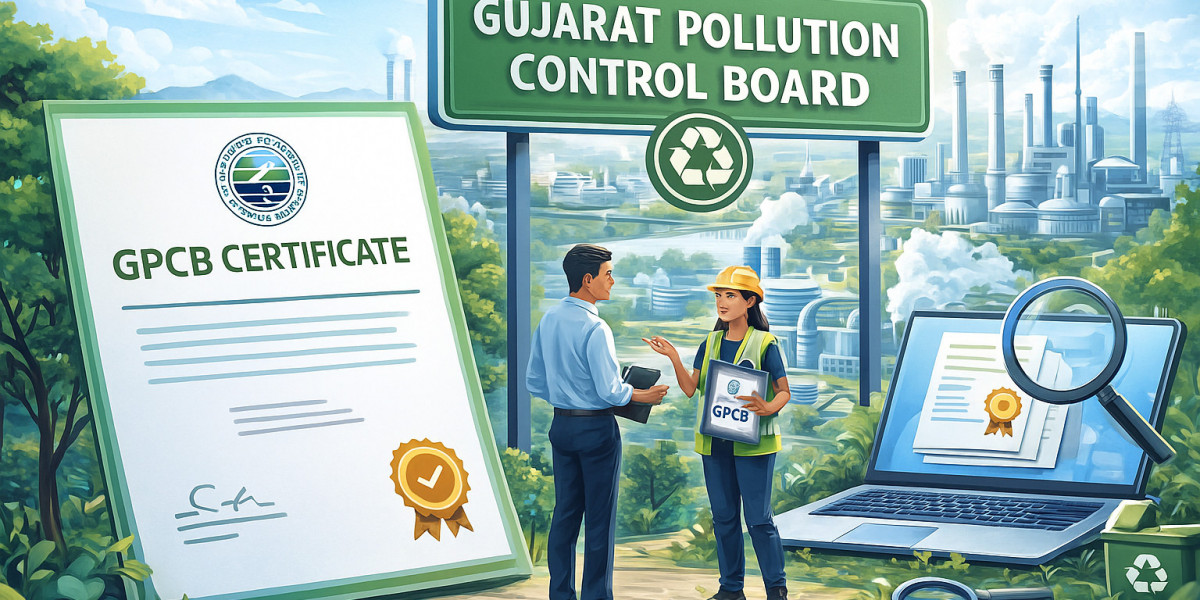Environmental compliance in the fast-growing industrial landscape of Gujarat is no longer a matter of choice; it is both a legal and operational requirement. The Gujarat Pollution Control Board (GPCB) is at the forefront of the environmental movement. It regulates, monitors, and ensures that industries do not pollute the air, water, or land. Setting up a new manufacturing unit, expanding your operations, or applying for a GPCB certificate? It is absolutely necessary to know the rules and the compliance framework for your business to run smoothly.
This guide is created based on the latest SEO EEAT principles—accuracy, expertise, authority, and trust—to give the right direction to lead the business, consulting, and entrepreneurial community in the effective navigation of GPCB requirements.
What is the Gujarat Pollution Control Board (GPCB)?
The Gujarat Pollution Control Board is the state-level environmental regulatory authority responsible for enforcing pollution control laws under the Water Act, Air Act, and Environment Protection Act. The board guarantees that industrial plants run with green standards, keep up with safe waste disposal systems, and take on sustainable operating procedures.
It is the GPCB that issues the consents, carries out the inspections, and keeps an eye on waste management; thus, the board is instrumental in sustaining the environmental health of Gujarat.
Why GPCB Compliance is Important for Industries
Companies that are working in Gujarat need to have a green signal from GPCB before setting up a unit or starting a process that may have an adverse effect on the environment. If they do not follow the rules, they can be met with:
Exorbitant fines
Shutdown/closure orders
Pollution costs
Delay in operations
Decreased trust/relationship with the stakeholders
Industries holding a genuine GPCB certificate get to keep their operations legal, besides displaying their eco-friendly stance.
Types of Permissions Issued by GPCB
The Gujarat Pollution Control Board (GPCB) issues various environmental consents and authorisations to different industries based on their category. These include:
1. Consent to Establish (CTE)
Such a permit is a must for any new industrial activity. Through CTE, the authorities make sure that the project complies with the pollution norms in terms of site selection, facilities, and waste management.
2. Consent to Operate (CTO)
Industries, after getting established, need to have a CTO in order to start their operations. This document assures that the plant is following pollution control requirements.
3. Renewals of CTO
CTO is a time-limited certificate and cannot be renewed indefinitely. It is compulsory for industries to renew their CTO on a regular basis, i.e., periodically, depending on their category (Green, Orange, or Red).
4. Waste Management Authorisations
Any kind of industry that produces or handles the following waste materials, namely, hazardous waste, biomedical waste, plastic waste, e-waste, and solid waste, must obtain additional approvals first before they are able to operate freely under the specific set of rules for those wastes.
Who Needs a GPCB Certificate?
Industries operating in sectors such as chemical manufacturing, engineering, pharmaceuticals, textiles, metallurgical units, food processing, and even service establishments like hospitals need a GPCB certificate.
Any business that releases effluents, emissions, noise, or waste into the environment must comply with GPCB regulations.
Documents Required for GPCB Registration
To apply for environmental consents, industries typically need:
Company registration documents
Project report or layout plan
Land documents and site details
Manufacturing process description
List of raw materials and chemicals
Water and electricity requirements
Air pollution control details
Effluent treatment plant (ETP) details
Hazardous Waste Management Plan
The exact list may vary based on industry category and application type.
How to Apply for a GPCB Certificate Online
The GPCB has transformed its consent system to a digital mode to provide speedy and transparent services.
Step-by-Step Process:
Open the GPCB web portal
Enter the minimum details and register your unit
Choose consent type (CTE, CTO, or renewal)
Fill up the business profile and upload documents
Submit the required amount
Inspection (if your industry is under a category that requires it)
Download the certificate online
The waiting time may vary according to the complexity of the industry as well as its category.
Industry Categories Under GPCB
GPCB categorises the industries into three categories, just like other state pollution control boards:
Green Category: No or negligible pollution potential
Orange Category: Reasonable pollution potential
Red Category: Considerable pollution potential
The charges, inspection, and paperwork change with each category.
Why Professional Assistance Helps
Environmentally correct practice is usually accompanied by technical documents, formal reports, and pollution control specifications. To save themselves from delays or rejections, a number of industries choose the expert route.
Professionals support the company in:
Creating a compliance plan
Preparing documents
Designing waste management
Guiding through the online application
Getting ready for inspection
It guarantees that the submissions will be done correctly and the approvals will be fast.
Conclusion
The Gujarat Pollution Control Board (GPCB) is the main body that takes care of the environment while also allowing rapid industrial development to take place. Getting a proper GPCB certificate, like CTE, CTO, or an authorisation, is the way to go for a legally operating and sustainable business.
Knowing the rules, having the right papers, and taking care of the environment will make sure that your company is compliant, efficient, and eco-friendly.
FAQs
1. What is the GPCB licence fee in Gujarat?
The fees are different depending on the industrial category and size, with Green units paying the least and Red category units paying the highest. The exact charges depend on the type of consent and the industrial capacity.
2. What is the qualification for the GPCB exam?
If candidates are applying for technical roles, then they should have a degree in environmental engineering, science, or related fields. The qualifications for the different posts vary.
3. How can I get a pollution control board certificate in Gujarat?
By registering on the GPCB portal, submitting the documents, and making the payment, you can complete the entire process online. After verification, the certificate is provided in digital form.
4. What is GPCB permission?
GPCB permission refers to the approvals, like Consent to Establish, Consent to Operate, and waste management authorisations that are necessary for environmental compliance.








